WMG News - Latest news from WMG
Waste2Race: The sewage-powered car on track to make history

Engineers and students at WMG at The University of Warwick are working on a hydrogen-powered car fuelled by sewage, in a project entitled Waste2Race. The hydrogen is a byproduct of water treatment technology, from Wastewater Fuels, being trialled at Severn Trent Water, and with it the team at the University are hoping to break records for hydrogen fuelled cars.
Mura Technology and WMG secure innovate UK grant to grow commercial opportunities for Hydrothermal advanced plastic recycling technology
WMG at the University of Warwick, Innovate UK (IUK) and advanced recycler of plastics Mura Technology are to continue their collaboration on sustainability with a new IUK funded, two-year Knowledge Transfer Partnership (KTP).
WMG will develop operational sustainability models for Mura’s Hydro-PRT advanced plastic recycling technology to identify opportunities for further improvements to the already sector-leading environmental performance of the process. Mura has already identified an annual carbon emissions saving of 40,000 tonnes at the first Hydro-PRT site in Wilton, Teesside, due to commence operations in 2024.
 Mura Technology is an advanced recycler of waste plastics, producing fossil-equivalent oils from post-use, mixed, multi-layered flexible and rigid plastics for the petrochemicals industry to create virgin-grade plastics, such as for use in food packaging. Mura's patented, innovative next generation processing technology, Hydro-PRT, produces high quality chemicals and oils with sector-leading sustainability attributes, creating a low carbon and circular model for a range of stakeholders working with polymers.
Mura Technology is an advanced recycler of waste plastics, producing fossil-equivalent oils from post-use, mixed, multi-layered flexible and rigid plastics for the petrochemicals industry to create virgin-grade plastics, such as for use in food packaging. Mura's patented, innovative next generation processing technology, Hydro-PRT, produces high quality chemicals and oils with sector-leading sustainability attributes, creating a low carbon and circular model for a range of stakeholders working with polymers.
The company's first commercial scale plant, at Wilton, Teesside, will become the world's largest advanced recycling plant when it commences operations later this year, with two further plants being built under licence with partners in South Korea and Japan, expected to come online by the end of 2024. Driven by increasing regulation on plastic waste, Mura has a global growth ambition for more than 1.5 million tonnes of recycling capacity in operation or development by 2032.
WMG will create a modelling platform that will operationalise sustainability at all future Mura project sites, including Life Cycle Assessments (LCAs), to demonstrate transparently how Hydro-PRT meets environmental requirements. The platform will be used to educate and inform stakeholders including global regulators, policy makers and the plastics value chain on the low carbon potential of
Hydro-PRT.
The KTP is the continuation of the IUK Smart Sustainable Plastic Packaging research partnership, where Reader of Sustainable Materials and Manufacturing at WMG, University of Warwick, Dr Stuart Coles successfully developed and published Life Cycle Analysis models, independent of Mura, for the Hydro-PRT process and the UK waste plastic recycling ecosystem. Dr Coles will also be the academic lead on this project.
Simon Broome Innovation Manager at WMG, University of Warwick, who co-wrote the application for the project, said: “I was blown away by the potential of this project to transform the process for recycling contaminated waste plastic. The team are highly committed and have already demonstrated impressive growth on their journey to make real sustainability gains in this important material sector.”
Mura’s Head of Sustainability and R&D, Dr Geoff Brighty, said: “Continuing the collaboration with WMG is critically important to bring this new science into our core business operation. Hydro-PRT has sector leading sustainability credentials, but every prospective site will be unique, influenced by the local energy grid, plant configurations as well as its material supply chain. The KTP project models will inform options appraisals and decision making, ensuring sustainability is at the heart of our global growth programme.”
For more information on developing a Knowledge Transfer Partnership application with WMG, contact wmgsme@warwick.ac.uk
For more information on WMG’s research in Sustainable Materials and Manufacturing visit: Sustainable Materials and Manufacturing Group (warwick.ac.uk)
WMG pledges support to make Coventry digitally inclusive
WMG at the University of Warwick is proud to be an active partner in Coventry City Council’s pioneering digital recycling scheme, the #CovConnects Device Bank.
The project, which is part of the Council’s Digital Inclusion programme and supported by the Cities Climate Change Strategy, was launched on principles of circular economy by reusing and repairing end of corporate life devices which are then distributed to local communities.
repairing end of corporate life devices which are then distributed to local communities.
The Council was awarded the funding following a successful application to the Time after Time fund. The fund was created and is distributed by Hubbub and Virgin Media O2, and looks to fund projects that help to close the digital divide while reducing electronic waste.
Cllr Richard Brown, Cabinet Member for Strategic Finance and Resources at Coventry City Council, said: “Our #CovConnects programme is all about making sure none of our residents are digitally excluded. That’s why I’m delighted we’ve won this funding.
“This money will allow us to expand our efforts and get more of these devices into the hands of the most vulnerable. Having your own device, which you can use every day, is something that has the potential to completely transform your life.
“This project is a true partnership with the NHS, WMG and other partners across the city. Together we can make Coventry truly digitally inclusive.”
Dr Russ Hall, WMG’s Lead for Circular Economy and Sustainable Manufacturing at the University of Warwick, and Chair of the Coventry City Climate Change Board Circular Pathway, added: “It’s really important to be a part of this fantastic scheme. We want to research the reuse, remanufacture and recycling of digital equipment. This is a great example of where sustainable practices like circular economy can address societal issues like digital poverty, and we want to do all we can to help it flourish and grow. It has real environmental benefits as part of the circular economy and can play a vital role in overcoming digital exclusion.”
Digital Recycling is a key element within the Council’s Climate Change Strategy. Dr Russ Hall and Friya Tailor from WMG, are working with colleagues from the Council to evaluate the environmental benefits of the project. The research will in turn be shared nationally enabling other organisations to learn from the scheme.
To find out more about the #CovConnects programme, visit: https://www.coventry.gov.uk/cov-connects
Virgin Media O2 and Hubbub established the Time After Time fund in 2022 in response to the nation’s growing e-waste problem, with the UK producing more electrical waste per person than any other country in the world (except for Norway).
#CovConnects was selected as one of eight winners from more than 120 entries by a panel of judges including TV presenter and environmentalist George Clarke, non-profit, Material Focus, digital inclusion charity, Good Things Foundation, plus Hubbub and Virgin Media O2.
Find out more about Sustainable Materials and Manufacturing research at WMG here: Sustainable Materials and Manufacturing Group (warwick.ac.uk)
Sustainable, low carbon circular plastic economy enabled by advanced plastic recycling process
New research shows an 80% reduction in global warming potential (GWP), when compared to incineration, by processing waste plastic via a unique advanced recycling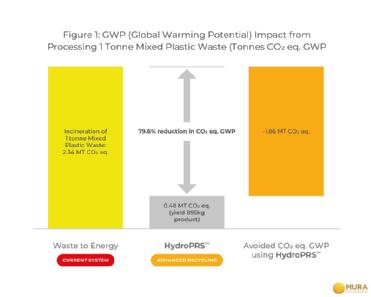 solution known as HydroPRS™, in a paper published by experts at WMG, University of Warwick.
solution known as HydroPRS™, in a paper published by experts at WMG, University of Warwick.
Researchers from WMG’s Sustainable Materials and Manufacturing team have been working with Mura Technology on a project focusing on the advanced recycling industry and the environmental impact of the associated processes.
Advanced recycling technologies (also known as chemical recycling) include a range of processes that break plastics down, converting them into hydrocarbon products that can replace the virgin fossil feedstocks used by the chemicals industry to create new plastics and other industrial products such as asphalt.
Dr Stuart Coles, Reader of Sustainable Materials and Manufacturing at WMG, University of Warwick, explained: “Advanced recycling will play an important role in realising the circular economy of plastics. The work conducted at WMG demonstrates a clear pathway towards Net Zero in recycled plastics and highlights improvements on the environmental footprint when compared with both existing production and disposal routes.
“We are delighted to see this work published as we explore the full potential of this technology moving forward.”
The peer-reviewed Life Cycle Assessment (LCA), reports that significantly reduced carbon emissions (measured as GWP in kilograms of CO2 equivalents) can be achieved if waste plastic is diverted towards HydroPRS™ and away from waste incineration – a comparable end of life treatment and currently, the fate of many ‘unrecyclable’ plastics.
Pioneered by Mura Technology, HydroPRS™, unlike pyrolysis, utilises supercritical water to convert post-consumer flexible, multi-layered and rigid plastics into high yields of stable, premium petrochemical feedstocks. Importantly, the products produced in the HydroPRS™ process were found in the LCA to have at least a comparable GWP when compared with naphtha, the fossil oil-based feedstock used in the production of plastics.
Dr Steve Mahon, Mura Technology’s CEO, said: “Resolving the global plastics crisis while reducing carbon emissions globally will inextricably require that the world is able to substitute fossil-based naphtha and other hydrocarbons for more sustainable feedstocks. This is Mura Technology’s ultimate goal and our innately scalable, innovative advanced recycling process using supercritical water is uniquely placed to pave the way to enable a low-carbon global circular plastics economy.”
Currently, the fate of unrecycled waste plastics is landfill, incineration or leakage into our waterways and oceans. All have negative impacts on the environment. Whilst incineration recovers some energy from plastic, none of these processes keep material within the circular economy, which in turn sustains the demand for virgin plastic from fossil-based sources.
Mura’s Chief Sustainability Officer, Dr Geoff Brighty, added: “As the global economy transitions away from fossil fuels, circular economies must operate at as low an environmental cost as possible. Alongside using the LCA to identify process improvements, the WMG team have demonstrated a clear, deliverable pathway to Net Zero for the HydroPRS™ process. This will help Mura decarbonise the petrochemical sector, whilst also reducing demand for fossil oil for plastic production by regenerating plastic waste into their feedstocks.”
The LCA is focussed on Mura’s first site in Teesside, UK and was funded through Innovate UK’s Smart Sustainable Plastic Packaging challenge (SSPP), as part of one of the demonstrator projects (grant number 49801).
Read the Hydrothermal Treatment of Waste Plastics: An Environmental Impact Study paper in full here s10924-023-02792-3.pdf (springer.com)
Coventry schools to build future cities from recycled household items
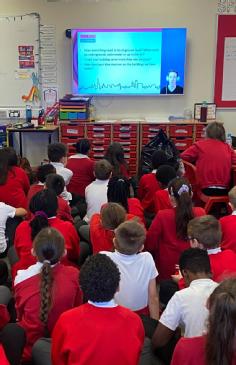
· TeenTech is a national charity working with school children to help them consider a future in digital, science technology and engineering.
· Their TeenTech City of Tomorrow initiative is working with nine Coventry schools with the help of WMG, University of Warwick
· Experts from WMG will deliver advice to children on sustainable materials, and inspire them as they design and build their city of the future out of recyclable household items
· A few Cities will then be exhibited at The Coventry Transport Museum
TeenTech City of Tomorrow will see Coventry school children make a city of recyclable household items, with help from researchers at WMG, University of Warwick who will teach them all about sustainability. A select few ideas – buildings and technology- will then be exhibited at the Coventry Transport Museum.
TeenTech is a national charity engaging children and teenagers in Digital, Science, Engineering and Technology and their latest initiative has launched today, the 11th November, in Coventry, which will see nine schools in Coventry build a futuristic sustainable city out of recyclable household items.
As it’s ‘Cities, Regions and Built Environment’ day at the COP26 summit in Glasgow, researchers from WMG at the University of Warwick are helping children understand sustainability and its importance, by delivering an online session about sustainable materials and why it’s important we use them more for a greener future, thanks to funding from the University’s Innovative Manufacturing and Future Materials GRP.
The children will then have two weeks to build their cities from recyclable household items. Three researchers from WMG, University of Warwick will run workshops, educating the children in using natural products for sustainable solutions and how to dispose of products.
On the 25th November the researchers from will then provide feedback, before selecting a few of the buildings and ideas to be exhibited at the Coventry Transport Museum from the end of the month.
Dr Stuart Coles from WMG, University of Warwick comments:
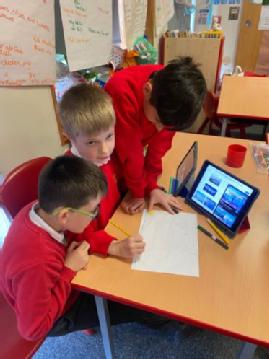
“Having spent my career researching how to reduce, reuse and recycle materials I am honoured to be a part of the TeenTech City of Tomorrow initiative, and look forward to seeing how creative the children can be in making a futuristic and environmentally friendly city.
“It is our children that will suffer from the damage we have caused and are causing to the planet, therefore it is imperative that we educate them from young age about sustainability and how they can create a cleaner and greener future for themselves and future generations, whilst we work out how we can change our ways to further prevent the climate crisis.”
Maggie Philbin, CEO of TeenTech comments:
“We want young people in Coventry to understand they can shape the future with their ideas. Young people think boldly, differently and inclusively and this is the thinking we need for a sustainable future. Tomorrow is very much a two-way event – experts will be sharing their knowledge, but we know that it will be the children who surprise everyone with their creativity, honesty and who will be the ones to challenge outdated thinking.
“Their buildings may be constructed from cardboard boxes but their ideas will be sophisticated and ones which should be seriously considered. They really are the architects, the engineers and the designers of the future. Let’s listen to them.”
Mrs Kaur, Class Teacher at Courthouse Green primary school comments:
"TeenTech is a great project to engage and enthuse the children and encourages them to consider how to be responsible about improving their environment. It has given the children the opportunity to think big about their world. their future and their role within it.
"The children are learning life skills, teamwork and are thinking outside the box to design and create cities that could effect change. The project is amazing! If I could give up a whole week to work on this, I would...it's real-life skills in the classroom."
Two children from year 5 at Courthouse Green Primary school have said:
"I love the project because it will help the future. It has made me think about climate change and how it is affecting our cities. In Coventry I see lots of litter and it gives our city a bad reputation. My team, Team Queen Tech are designing a treehouse from recycled materials that filters wastewater to use again." - Bhavika age 9
"We have designed a hotel for homeless people which is made from sustainable materials like bamboo." Sanjot Age 9
Electric vehicles could be powered by Hydrogen harvested from sewage
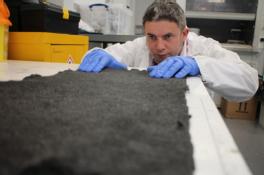 Hydrogen is valuable as it is a renewable source, and could be sold to the chemicals and plastics industry or used in hydrogen fuel cells for energy storage or electric vehicles
Hydrogen is valuable as it is a renewable source, and could be sold to the chemicals and plastics industry or used in hydrogen fuel cells for energy storage or electric vehicles- The ability to take hydrogen from waste water provides a new economic and environmental opportunity, however until now it has been incredibly expensive to suffice
- Using a recycled carbon fibre mat, researchers from WMG, University of Warwick, have been able to produce Hydrogen from wastewater for Severn Trent
Wastewater treatment is vital to remove pathogens, but is incredibly energy intensive. The ability to treat it more sustainably is a challenge researchers from WMG, University of Warwick have been able to achieve, using recycled carbon fibre mats to produce hydrogen from waste water.
Treating wastewater is a vital process, as it removes pathogens and protects the environment, however this comes at its own environmental cost, as it is highly energy intensive, using around 3% of energy use in the UK – the equivalent to 13 billion kilowatt hours.
The water and waste company Severn Trent set researchers from WMG, University of Warwick, the challenge of finding a more energy efficient way to treat wastewater, with the team successfully building on research into Microbial Electrolysis Cells.
Microbial Electrolysis Cells involves using electromagnetic microorganisms to break down organic pollutants in waste water, producing clean water and hydrogen gas. The ability to produce Hydrogen gas is valuable in itself as it can be sold to chemical and plastics industry, or for use in hydrogen fuel cells for energy storage or electric vehicles.
Although this all sounds promising it hasn’t been developed on an industrial scale, as the anode materials - which are used in the reaction to breakdown the organic pollutants – are made of graphite or carbon, and cost several hundred pounds per square metre, and produce low rates for Hydrogen.
Dr Stuart Coles and his team therefore took on the challenge of refining the technique by looking at alternative anode materials and processing methods, and successfully identified recycled carbon fibre mats as an alternative anode, which costs only £2 per square metre, making it significantly cheaper than existing anode materials.
After testing the carbon fibre mats on synthetic wastewater and real wastewater, researchers found the bacteria developed on the recycled carbon fibre anode, which had better temperature tolerance and produced more hydrogen than previously used materials.
They then decided to pilot their techniques at Severn Trent’s Minworth waste treatment site, where they successfully processed up to 100 litres of wastewater per day and managed to remove 51% of organic pollutants and up to 100% of suspended solids from the water while producing 18 times more hydrogen (at 100% purity) than the graphite material.
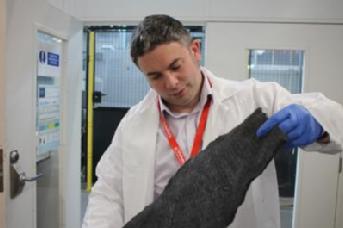 Dr Stuart Coles, from WMG, University of Warwick comments:
Dr Stuart Coles, from WMG, University of Warwick comments:
“We are really excited about this technology. By taking waste from the automotive and aerospace sectors, we have developed a circular solution to a longstanding problem. Instead of just treating the wastewater, we are now able to extract value from it in the form of hydrogen at a lower cost than ever before.
“The next phase of this work is look at optimising the design of the microbial electrolysis cells and further reduce the level of pollutants in the water. This in turn should help produce even more hydrogen!”
Bob Stear, Chief Engineer at Severn Trent adds:
“The performance boost and cost savings demonstrated from this research mean that MEC technology is one step closer to being cost competitive with existing wastewater treatment assets. WMG have also demonstrated that this technology has the potential to create a more circular wastewater treatment process which will be essential to delivering on our long term sustainability goals and Net Zero plans. We’re currently scoping scaling up the technology at our test-bed plant in Redditch.”
ENDS
2 NOVEMBER 2021
NOTES TO EDITORS
High-res images available at:
https://warwick.ac.uk/services/communications/medialibrary/images/september_2021/img_1054.jpg
Caption: Dr Stuart Coles from WMG, University of Warwick with graphene
Credit: WMG, University of Warwick
https://warwick.ac.uk/services/communications/medialibrary/images/september_2021/img_1054.jpg
Caption: Dr Stuart Coles from WMG, University of Warwick with graphene
Credit: WMG, University of Warwick
https://warwick.ac.uk/services/communications/medialibrary/images/september_2021/img_1043.jpg
Caption: Dr Stuart Coles from WMG, University of Warwick with graphene
Credit: WMG, University of Warwick
https://warwick.ac.uk/services/communications/medialibrary/images/september_2021/img_1058.jpg
Caption: A sample of a roll of graphene
Credit: WMG, University of Warwick
For further information please contact:
Alice Scott
Media Relations Manager – Science
University of Warwick
Tel: +44 (0) 7920 531 221
E-mail: alice.j.scott@warwick.ac.uk
WMG Professor joins Clean Growth Leadership Network
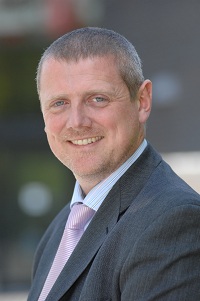 Head of WMG’s Sustainable Materials and Manufacturing Research Group, Professor Kerry Kirwan, has been appointed as a Fellow to the Clean Growth Leadership Network (CGLN).
Head of WMG’s Sustainable Materials and Manufacturing Research Group, Professor Kerry Kirwan, has been appointed as a Fellow to the Clean Growth Leadership Network (CGLN).
The CGLN is committed to economic growth for all whilst substantially reducing carbon emissions. The world-class network is made up of Founders, Fellows, Partners and Members united in their commitment to transform to a global clean economy.
Professor Kirwan explains: “I am delighted to have been appointed as a Fellow of the Clean Growth Leadership Network – the opportunity to work with some of the UK’s leading thinkers and practitioners tackling critical issues on the climate change agenda is hugely exciting. I’m really looking forward to introducing them to our research here at WMG and the wider University.”
Professor Kirwan is a specialist in circular economy, sustainable materials, polymer processing and industrial applications. He has extensive experience of developing environmentally friendly materials for application within numerous industries.
Read more about WMG’s Sustainable Materials and Manufacturing research here: Sustainable materials and manufacturing (warwick.ac.uk)
WMG Professors help tackle Net Zero solutions ahead of COP26
Ahead of COP26, voices across the political spectrum and from a range of leading UK universities have come together to produce a unique collection of essays focusing on Net Zero solutions.
Each is co-written by an academic and a Parliamentarian and sets out the areas where work is still needed on climate policy and demonstrates how readily to hand many policy and technical solutions are. It showcases the strength of UK science and research and the level of cross-party support for climate action.
Two WMG Professors have produced essays as part of the series. Professor David Greenwood together with Lilian Greenwood MP, has written ‘Driving the electric vehicle revolution’, and Professor Kerry Kirwan has, with Ben Lake MP, written ‘Overcoming barriers to the circular economy’.
Caroline Lucas MP, Chair of the APPG on Climate Change, explains: “The APPG on Climate Change was founded to coincide with the passing of the 2008 Climate Change Act – a vote that achieved almost unanimous support from across the political spectrum. As current Chair of the APPG on Climate Change, I see great value in striving to maintain and build upon this cross-party consensus where possible. We won’t all agree on the necessary course of action in each sector. And we may not even agree on the speed or scale with which it is necessary to reduce emissions. But we share a common conviction that the climate crisis is a challenge that can and must be surmounted. Deeper engagement between parliamentarians and the scientific community is a vital step in ensuring that we do. It is in that spirit that I fully endorse the work that has gone into producing this collection of essays.”
 In his essay, co-authored with Lilian Greenwood MP, Professor David Greenwood, CEO of WMG High Value Manufacturing Catapult at the University of Warwick explains: “Whilst the coronavirus pandemic has resulted in devastating personal and economic impacts, it has also caused us to challenge some of our preconceptions. The public has experienced clean air as a result of reduced transport and industrial emissions. People have taken to their bikes in record numbers and with the trials of rental e-scooters there’s a real opportunity for them to replace car and public transport usage for short journeys - at least in good weather.
In his essay, co-authored with Lilian Greenwood MP, Professor David Greenwood, CEO of WMG High Value Manufacturing Catapult at the University of Warwick explains: “Whilst the coronavirus pandemic has resulted in devastating personal and economic impacts, it has also caused us to challenge some of our preconceptions. The public has experienced clean air as a result of reduced transport and industrial emissions. People have taken to their bikes in record numbers and with the trials of rental e-scooters there’s a real opportunity for them to replace car and public transport usage for short journeys - at least in good weather.
“These behavioural shifts, along with the persistent drivers of air quality and climate change reinforce the shift to EVs.”
 Kerry Kirwan, WMG’s Professor of Sustainable Materials and Manufacturing explains: “Given the continued focus on how we use our limited planetary resources, the potential for green business models and practices to help our economic recovery post-pandemic and the imminence of COP26, it is great to see such a breadth of collected thinking coming together in this publication – it was a really valuable exercise that I am very pleased to have been part of”.
Kerry Kirwan, WMG’s Professor of Sustainable Materials and Manufacturing explains: “Given the continued focus on how we use our limited planetary resources, the potential for green business models and practices to help our economic recovery post-pandemic and the imminence of COP26, it is great to see such a breadth of collected thinking coming together in this publication – it was a really valuable exercise that I am very pleased to have been part of”.
Read the report and essays in full here: https://www.policyconnect.org.uk/research/net-zero-exchanges-connecting-policy-and-research-climate-action
About the APPCCG
The All-Party Parliamentary Climate Change Group runs events and activities in parliament with the purpose of advancing understanding of policy issues surrounding climate change and enabling cross-party discussion and action on climate policy.
This is not an official feed of the House of Commons or the House of Lords. It has not been approved by either House or its committees. All-Party Parliamentary Groups, forums and commissions are informal groups of Members of both Houses with a common interest in particular issues. The views expressed in the webpages are those of the groups.
About Policy Connect
Policy Connect is a membership-based, not-for-profit, cross-party think tank.
We bring together parliamentarians and government in collaboration with academia, business and civil society to inform, influence and improve UK public policy through debate, research and innovative thinking, so as to improve peoples’ lives.
We lead and manage an extensive network of parliamentary groups, research commissions, forums and campaigns. We are a London living wage and disability confident employer and a Member of Social Enterprise UK, and have been operating since 1995. Our work focuses on key policy areas including: health & accessibility; education & skills; industry, technology & innovation; and sustainability.
We shape policy in Westminster through meetings, events, research and impact work.
WMG research is acknowledged at important industrial awards
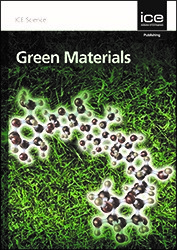 WMG Professor Ton Peijs’s paper entitled: “Turning low-cost recycled paper into high-value binder-free all-cellulose panel products” has been awarded the prestigious Green Materials Journal Prize by IEC Publishing, part of the Institute of Civil Engineers.
WMG Professor Ton Peijs’s paper entitled: “Turning low-cost recycled paper into high-value binder-free all-cellulose panel products” has been awarded the prestigious Green Materials Journal Prize by IEC Publishing, part of the Institute of Civil Engineers.
The IEC Awards recognise research of exceptional quality and benefit to the civil engineering, construction and materials science community.
Professor Peijs will be officially presented with the award at a ceremony in London in October.
Ton Peijs is a Professor of Polymer Engineering and Director of the National Polymer Processing Centre at WMG. His research focuses mainly on materials and processing innovations in polymers and composites. Ton has made notable contributions to areas such as hybrids, multifunctional materials, damage tolerance and durability, natural fibres and bio-based materials, polymer fibres and nanocomposites. He has also pioneered the development of sustainable composites, including the development of fully recyclable all-polymer composites.
Read Professor Peijs’s paper in full here: Turning low-cost recycled paper into high-value binder-free all-cellulose panel products | Green Materials (icevirtuallibrary.com)
Read more about WMG’s plastics research here: Plastics (warwick.ac.uk)
Chitin can be successfully extracted from Black Soldier Fly husks
- Chitin comes from the husks of Black Soldier Fly Larvae, which are waste products of black soldier fly farming
- Black soldier fly farming is commonly done in parts of Africa and South East Asia, as they are used as a source of protein for livestock, therefore, to be able to use the husks could create a new economic opportunity
- The extraction process gives comparable quality material to other feedstocks, and extracts 50% of the available chitin in the husks researchers from WMG, University of Warwick have found
Chitin is a naturally occurring polymer from the husks of Black Soldier Fly larvae, usually considered a waste product from the farming of the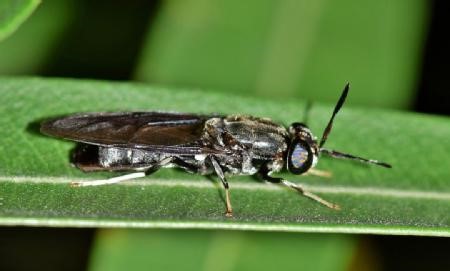 Black Soldier Fly larvae. However, researchers from WMG at the University of Warwick decided to see if they could extract chitin from the husks, creating a new economic opportunity.
Black Soldier Fly larvae. However, researchers from WMG at the University of Warwick decided to see if they could extract chitin from the husks, creating a new economic opportunity.
Chitin is a sustainable source of protein in countries in South East Asia and south parts of Africa. When extracted it can be characterised and used in the biomedical industry, for example to make antiseptics and anticancer treatments.
In the report, ‘Purification of chitin from Black Soldier Fly larvae husks’, researchers from WMG at the University of Warwick have successfully extracted chitin from the husks of Black Fly Soldiers.
The extraction route developed in this work obtains around 50% of the total available chitin, which is comparable to existing processes.
Dr Stuart Coles, from WMG at the University of Warwick comments:
“We have found a new way of extracting chitin from the husks of Black Soldier Flies, which are commonly farmed in parts of Africa and South East Asia as they can be used as a source of protein for livestock.
“Chitin can be used to make antiseptics and anticancer treatments, so to be able to extract it from the husks which are a by-product of the farming process means that there’s potential to be more sustainable by using what would usually go to waste.”
The extraction process that the researchers developed at WMG used cheap and readily available materials to reduce the cost whilst still producing a high-quality material.
Dr Stuart Coles explains:
“The process involved the use of mild, readily available and inexpensive chemicals to breakdown the natural structure of the husk and allowed us to isolate the chitin. In isolating the chitin, we only used water as a solvent, and a large part of our work focused on reducing the amount of water being used as it is a critical resource in countries where Black Soldier Flies are farmed.”
Research can now continue to investigate how to commercialise the extraction process into a larger process.
ENDS
27 APRIL 2021
NOTES TO EDITORS
High-res images available at:
https://warwick.ac.uk/services/communications/medialibrary/images/april_2021/fly-1627592_1920.jpg
Caption: A Black Soldier Fly
Credit: Brett Hondow, Pixabay
For further information please contact:
Alice Scott
Media Relations Manager – Science
University of Warwick
Tel: +44 (0) 7920 531 221
E-mail: alice.j.scott@warwick.ac.uk
